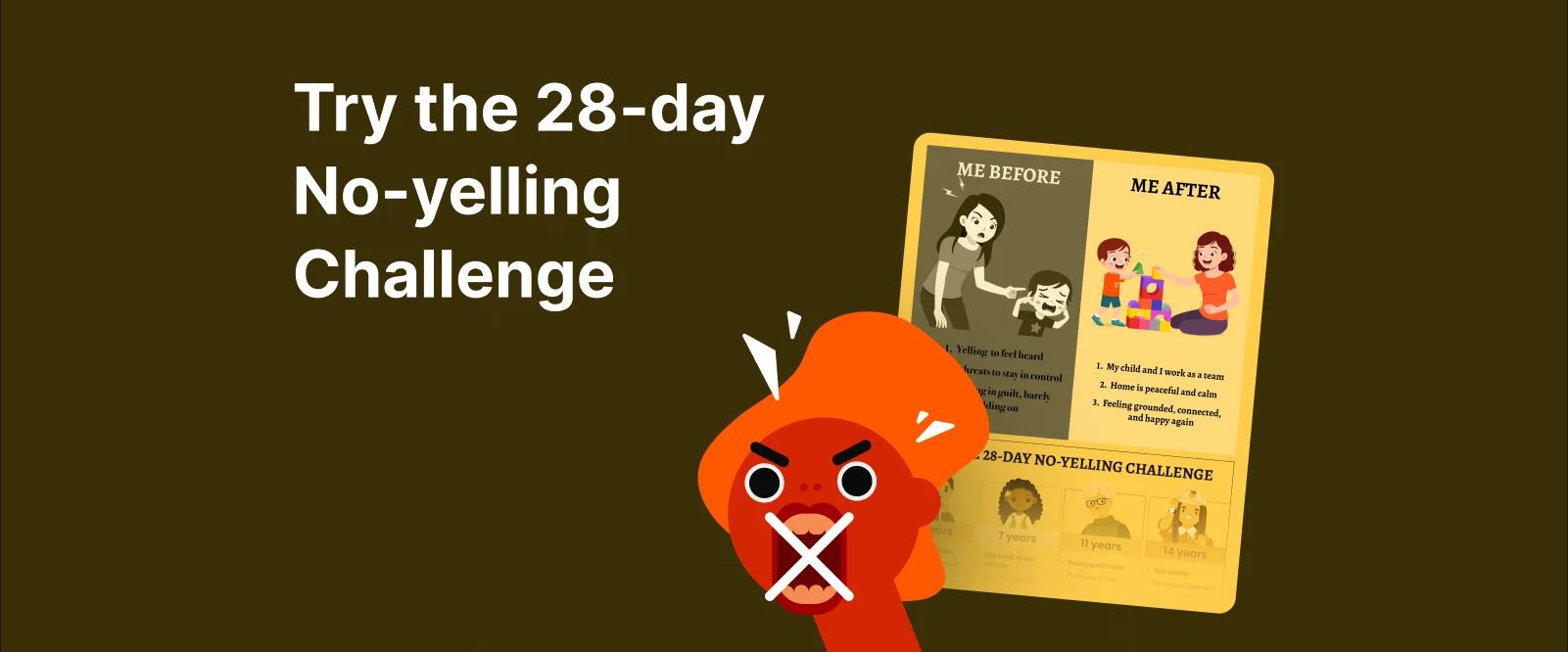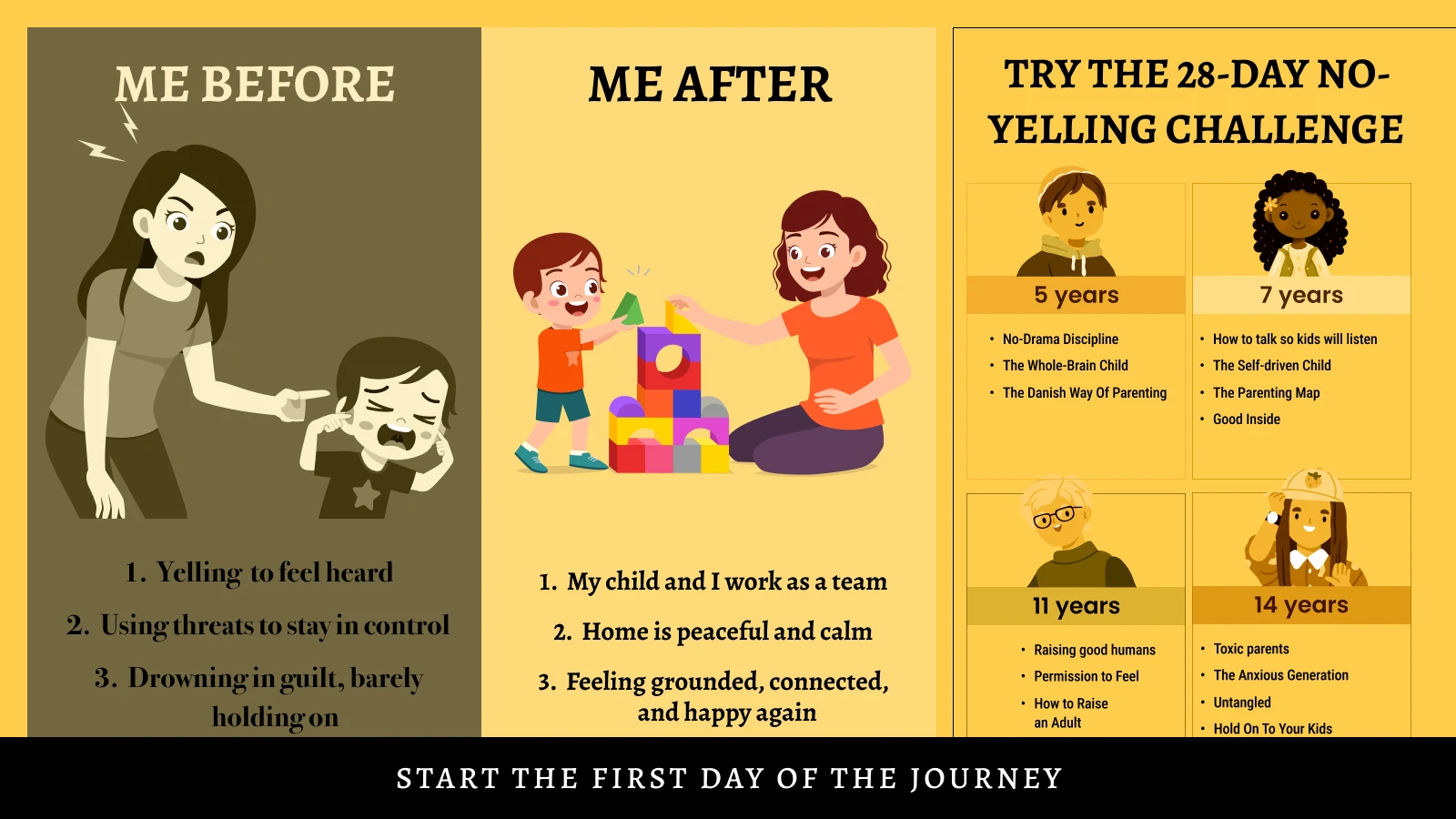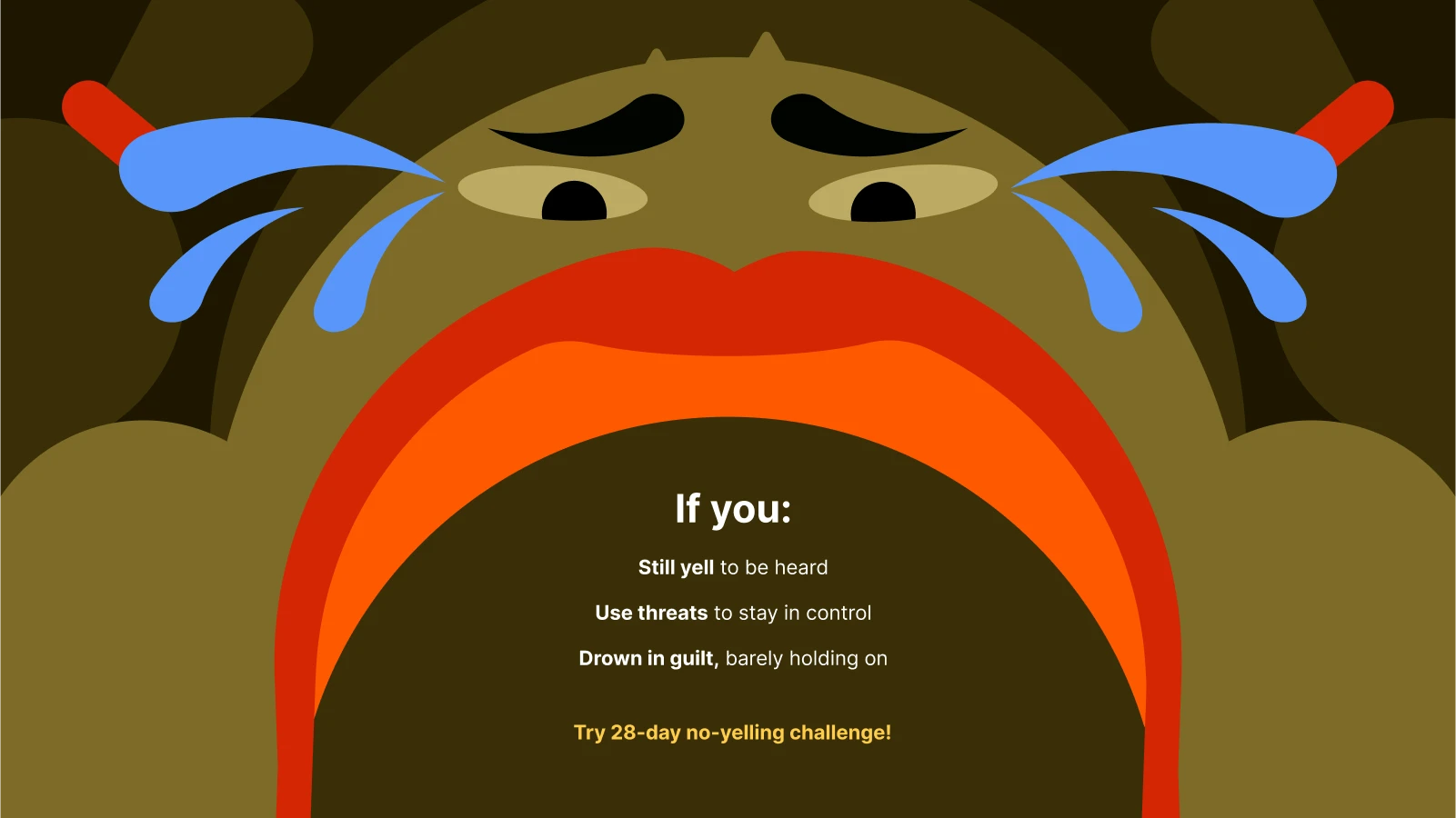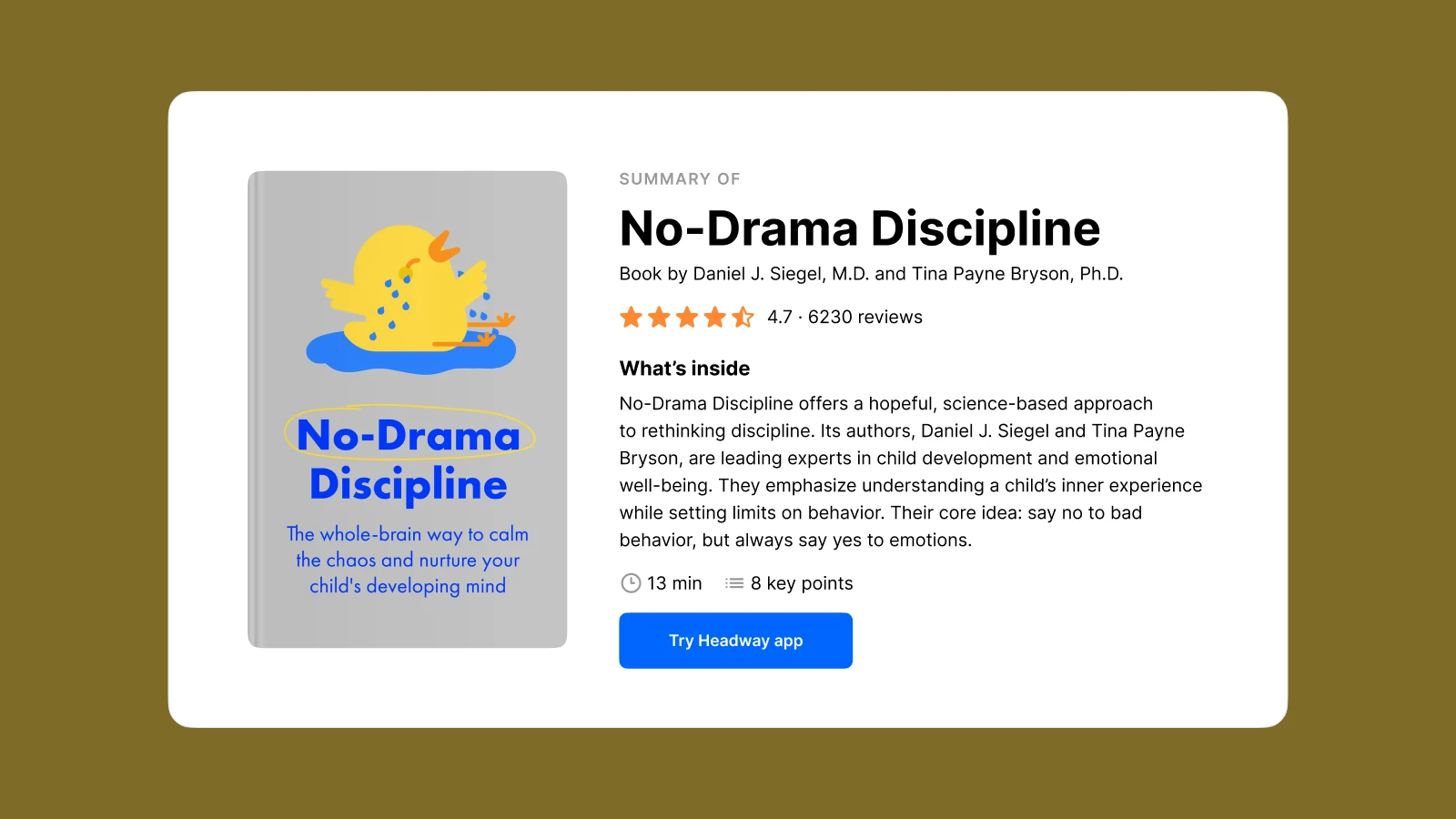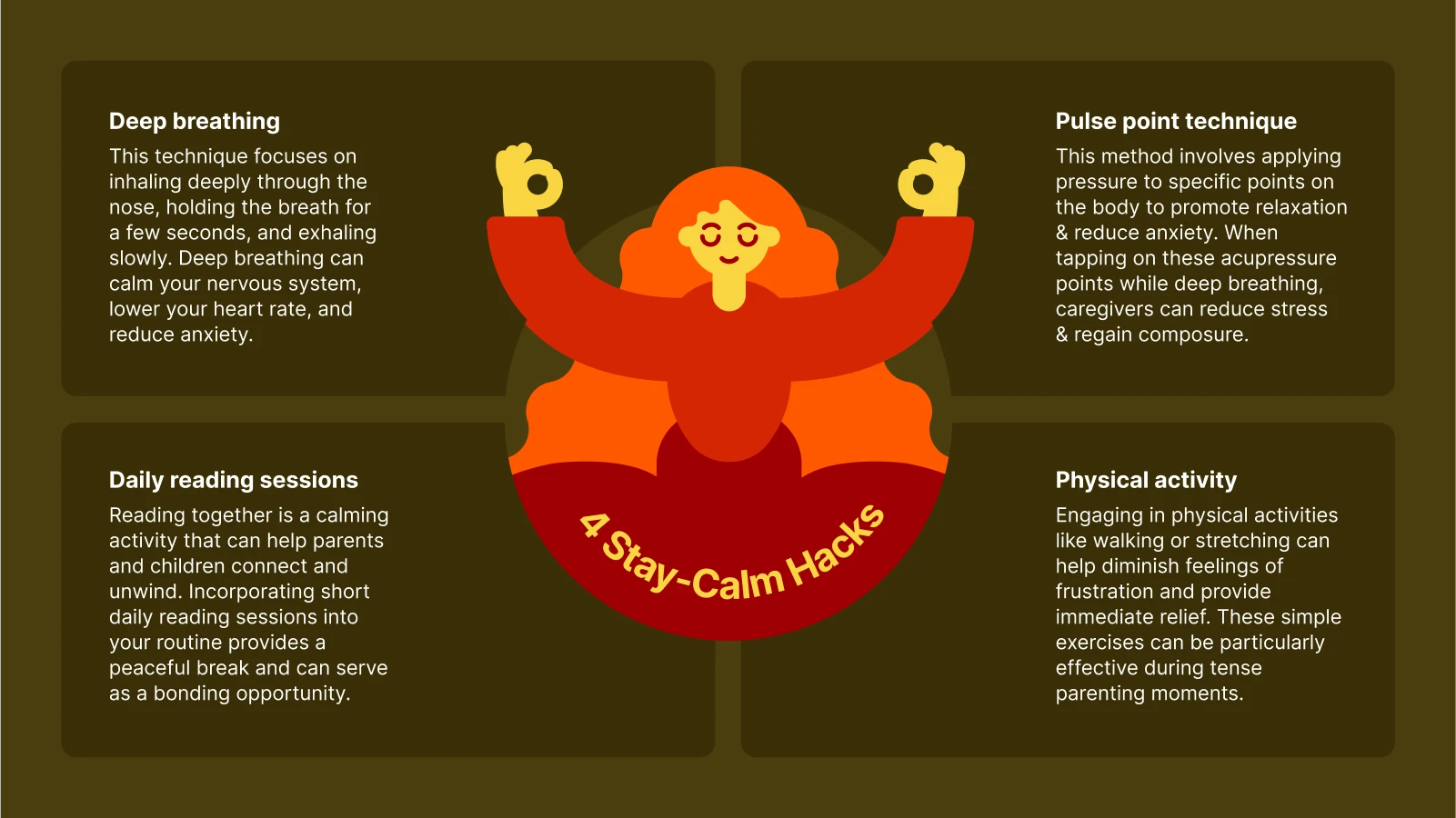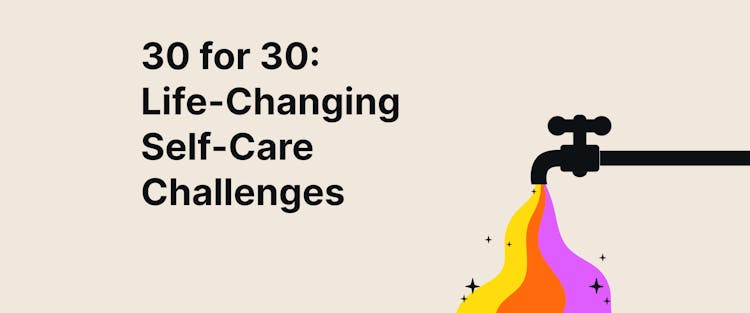What if you could create a calm, peaceful home without raising your voice? Next time you feel the urge to blow off steam without hurting your kid, try the 28-Day No-Yelling Challenge. This program will help you become a calmer parent, redirect your emotions, and finally get your child to listen.
With the right strategies, parenting tips, and self-learning tools, you can become the caring parent you've always wanted to be. And the life-changing lessons from Headway's summaries of top parenting books, like 'Have a New Kid by Friday' by Kevin Lemar and 'Battlefield of the Mind for Kids' by Joyce Meyer, are a great start!
Disclaimer: The 28-Day No-Yelling Challenge is a program designed to help parents improve their parenting approach. Please note that results may vary, and this challenge should not be used as a substitute for professional help or family counseling.
In this article, you'll learn
How the 28-Day No-Yelling Challenge helps parents break the cycle of yelling
The importance of active listening in improving communication with your children
Practical tips for emotional regulation and managing your triggers
How simple techniques like deep breathing, pulse point techniques, and physical activity can help calm down challenging parenting moments
How positive reinforcement can change your child's behavior and family life.
Before you move on, take the short quiz below and determine whether you're a peaceful parent or an angry parent.
Parenting style quiz: Are you a peaceful parent or an angry parent?
Are you calm and patient, or do you find yourself losing your temper in challenging moments? Find out where you stand and gain insights to strengthen your parenting approach.
What's the 28-Day No-Yelling Challenge, and why should you try it?
The 28-Day No-Yelling Challenge is a parenting program that aims to help parents break the yelling cycle by promoting calm communication, emotional regulation, and positive reinforcement techniques.
Created by Marko Juhant, a veteran of parenting courses and strategic parenting, this approach offers a more positive and supportive atmosphere for your children. With its daily lesson, parenting techniques, and practical examples, you have a guide to follow for four weeks straight.
The program's main goals include:
Reduce yelling
Talk calmly
Strengthen emotional connections
Teach emotional regulation
The program also helps parents identify their anger triggers. This way, they can manage their responses during power struggles or screen time battles. If you know how to recognize these triggers, you can learn to stay calm and foster a positive environment for your kids.
So, if you:
Still yell to be heard
Use threats to stay in control
Drown in guilt, barely holding on
It's time for a change!
📘 Ready to parent with peace, not panic? Start Headway for calm parenting strategies!
Why yelling isn't the answer: The science behind your anger
According to Psychology Today, yelling results from a rapid increase in adrenaline and cortisol, the same hormones that activate your survival mechanism. So, when you yell, your "fight or flight" instinct kicks in.
Your body's automatic response to stress often leads to shouting as a way to regain control, even if the actual situation isn't worthy of an outburst. Suppose you're trying to finish an important work task, when your 5-year-old suddenly starts throwing a tantrum because they want a toy that isn't available.
You feel overwhelmed by the noise and urgency of the situation. And in the heat of the moment, you instinctively shout at the child, saying, "Stop screaming!" even though the toy request could have been addressed calmly.
Yelling might seem like a quick fix, but its long-term effects can be damaging to both parent and child.
Some studies even say that yelling is as harmful as hitting, and it may cause depression and aggressive behavior in children. In a child psychology book, 'No-Drama Discipline,' clinicians Daniel J. Siegel and Tina Payne Bryson criticize yelling and explain that it may mentally exhaust parents and even lead to emotional burnout.
Because of that, if you fall into this tendency, it would be wise to change your behavior and work on your emotions before it's too late. And saying "no" to emotional outbursts, anger, and yelling for no less than 28 days can be the first step toward positive parenting.
First week no-yelling plan: Your step-by-step guide to strategic parenting
When taking on the 28-Day No-Yelling Challenge, focus on building new habits and strategies to replace yelling with calm, effective communication.
Key takeaways for the first week:
Days 1-3: Focus on listening without reacting to your child to build trust.
Days 4-5: Use positive reinforcement to encourage desirable behaviors.
Days 6-7: Teach emotional regulation by recognizing your own triggers and modeling calm behavior.
Follow along for a more detailed breakdown of your weekly gentle parenting guide!
📘 Want the full roadmap to calm parenting? Get Headway for step-by-step guidance!
Days 1-3: Practice active listening
Reading recommendation: 'No-Drama Discipline' by Daniel J. Siegel, MD, and Tina Payne Bryson, PhD — a parenting guide with science-backed strategies for handling difficult behavior and strengthening the parent-child relationship.
Practical exercises
1. Mirroring: Reflecting back what your child says helps them feel heard and understood. This approach shows them that you're actively listening to their feelings, even if you don't agree with them.
Example:
Child: "I don't want to do my homework!"
Parent: "It sounds like you're really frustrated about having to do homework right now. Tell me more about what's bothering you."
2. Giving full attention: In 'No-Drama Discipline,' Siegel and Bryson stress the importance of fully focusing on your child when they speak. It means putting aside distractions (like phones or tasks) to listen attentively.
Example:
When your child talks to you, make eye contact, kneel down to their level, and put down your phone.
Parent: "I'm listening. Go ahead and tell me what happened at school today."
3. Encouraging open communication: After reflecting on your children's emotions, ask open-ended questions that invite them to explain further. This level of attention shows that you care about their opinion.
Example:
Child: "I don't want to go to school today!"
Parent: "I hear that you're feeling nervous. What part of school is making you feel that way?"
Days 4-5: Use positive reinforcement
Reading recommendation: 'The Self-Driven Child' by William Stixrud, PhD, and Ned Johnson — a roadmap for raising confident and self-reliant children.
Practical exercises
1. Fostering autonomy: One of the central ideas in 'The Self-Driven Child' is the importance of giving children autonomy and allowing them to make decisions. It boosts their intrinsic motivation and self-confidence.
Example: Instead of saying, "Good job cleaning up your room," allow your child to choose when and how to tackle their chores, reinforcing their sense of responsibility and control.
2. Encouraging problem-solving: Positive reinforcement should also include helping children develop problem-solving skills. When they encounter obstacles, reinforce their attempts to solve problems rather than giving them immediate solutions.
Example: If a child is struggling with a homework problem, instead of just giving the answer, ask, "What do you think could be a good first step to solve this?"
3. Modeling behavior: Stixrud and Johnson stress that parents should model the behavior they want to see in their children. When children see their parents handling challenges with resilience or communicating calmly, they are more likely to mirror those behaviors.
Example: When you handle a stressful situation calmly, say, "I felt frustrated, but I took a deep breath because I want to handle challenges with patience. I think that helps me think more clearly."
Days 6-7: Teach emotional regulation
Reading recommendation: 'The Explosive Child' by Ross W. Greene, PhD — a detailed overview of the Collaborative Problem Solving (CPS) model, which advocates for working collaboratively with children to identify the root causes of their behavior and find solutions.
📘 Want more expert strategies like this? Get Headway for parenting summaries that work!
Practical exercises
1. Solve problems together: When your child is upset, instead of yelling or punishing, try solving the problem together. Talk about what's bothering them and find a way to fix it as a team.
Example:
Parent: "I see you're upset because your brother took your toy. Let's figure out how to fix this without yelling or hitting. What do you think we should do?"
2. Stay calm when things get tough: When your child is angry, keep your voice soft and give them some space. Let them know you understand how they feel.
Example:
Parent: "I can tell you're really mad right now. It's okay to feel that way. Let's take a deep breath together, and when you're ready, we can talk."
3. Notice your feelings: If your child's behavior is making you upset, pause for a moment and check in with yourself.
Example:
Parent: "I'm starting to feel frustrated, and I know yelling won't help. Let me take a deep breath before we keep talking."
Self-reflection
Dedicate the final days of the first week to self-reflection. Write down your thoughts and concerns. Note what went well and what needs improvement. This way, you'll be prepared to enter the following with an open mind and heart.
📘 Ready to keep growing? Download Headway for insights that support your journey!
The top four techniques to stay calm: From reading to physical activity
If you want to complete the 28-Day No-Yelling Challenge, you also need practical tools and methods to handle stress without resorting to yelling. Deep breathing, pulse point technique, physical activity, and daily reading sessions can help you with that.
1. Deep breathing
This technique focuses on inhaling deeply through the nose, holding the breath for a few seconds, and exhaling slowly. Deep breathing can calm your nervous system, lower your heart rate, and reduce anxiety.
2. Pulse point technique
This method involves applying pressure to specific points on the body to promote relaxation and reduce anxiety. When tapping on these acupressure points while deep breathing, caregivers can reduce stress and regain composure.
3. Physical activity
Engaging in physical activities like walking or stretching can help diminish feelings of frustration and provide immediate relief. These simple exercises can be particularly effective during tense parenting moments.
4. Daily reading sessions
Reading together is a calming activity that can help parents and children connect and unwind. Incorporating short daily reading sessions into your routine provides a peaceful break and can serve as a bonding opportunity.
Commit to one book summary from Headway's online library to make your reading habit stick and start your self-growth journey today!
Improve your parenting skills with Headway book summaries
As a parent, you surely have those tough moments when letting your anger out seems like the only way to regain control. But here's the thing: the more you yell at your kids, the more you distance yourself from them.
Trying the 28-Day No-Yelling Challenge will help you control your emotions and be the parent your child needs you to be. With the right tools and educational resources, like the Headway app with its collection of bite-sized insights, you can hit your parenting goals faster.
Need more inspiration and practical tips? Then, explore the best parenting quotes for the ultimate inspiration and install helpful parenting apps to stay close with your child and address their needs.
Download the Headway app today and take the first step toward peaceful parenting. With a wealth of resources at your fingertips, you can continue to grow as a better parent and foster a positive environment for your children!
Frequently Asked Questions
How does this challenge compare to other parenting tools and courses?
The 28-Day No-Yelling Challenge is special because it breaks things down into easy steps and offers helpful parenting tips you can actually use.
It's designed to help parents make real, lasting changes and become calmer and more patient with their kids. If you're looking for practical advice to improve how you parent, this challenge is a great place to start.
How can I get started with the 28-Day No-Yelling Parenting Challenge?
Simply sign up on official platforms like ParentingLeader, download the materials, and follow the daily instructions. Remember, the key is consistency and commitment to becoming a better parent.
Can this challenge help with screen time conflicts and power struggles?
Yes, the challenge offers parenting strategies and techniques to manage common issues, such as screen time conflicts and power struggles, helping parents become more effective and calm in their approach.
Is this challenge suitable for parents of children with ADHD or frequent meltdowns?
Absolutely. The 28-Day No-Yelling Challenge provides parenting tips designed to help manage challenging child behavior, including meltdowns and tantrums commonly seen in children with ADHD.
Where can I find real-life testimonials and reviews of the challenge?
You can find real-life testimonials and reviews on parenting platforms like ParentingLeader and social media, where countless other parents share their experiences and success stories with the 28-Day No-Yelling Challenge.

